Challenges and Strategies: Parenting Autistic Children Report
VerifiedAdded on 2021/05/31
|15
|3991
|121
Report
AI Summary
This report explores the multifaceted challenges encountered by parents raising children diagnosed with autism spectrum disorder (ASD). The introduction highlights the increased prevalence of ASD and the heightened stress levels experienced by parents compared to those with neurotypical children, emphasizing behavioral problems, communication difficulties, and the significant time and financial burdens associated with therapies and treatments. A comprehensive literature review delves into the specific stressors, including externalizing behaviors, repetitive activities, and the impact on family routines and social lives. The research questions focus on identifying challenges, contributing factors, and effective coping techniques. The methodology employs a post-positivism research philosophy and a deductive approach, utilizing primary data collected through structured interviews with parents. The findings reveal significant challenges related to unpredictable behaviors, limited social interaction, and the impact of routine changes. Analysis of the interview data underscores the need for increased social support and effective strategies for managing the complexities of parenting an autistic child, including insights on the emotional and social impact on the entire family.
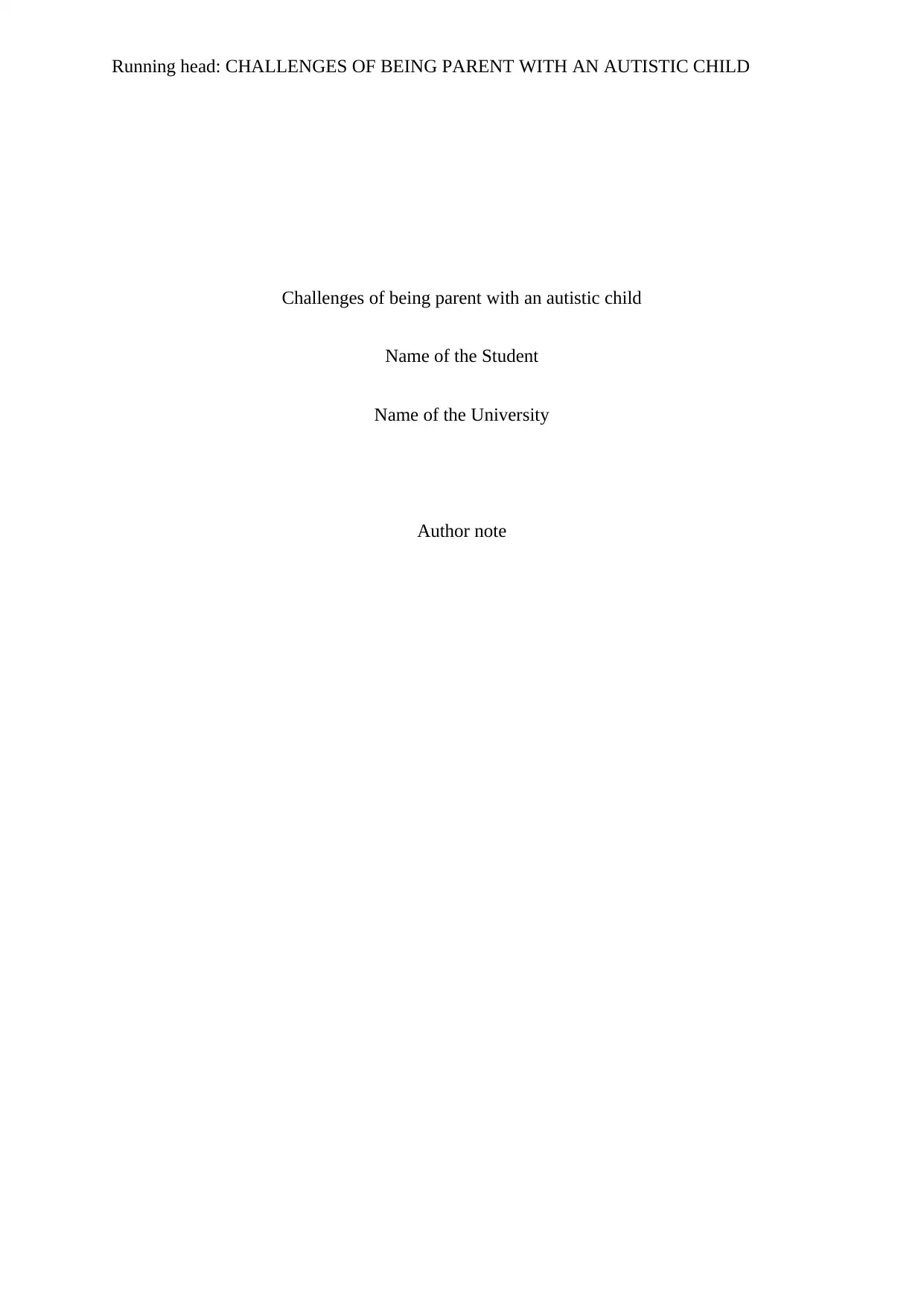
Running head: CHALLENGES OF BEING PARENT WITH AN AUTISTIC CHILD
Challenges of being parent with an autistic child
Name of the Student
Name of the University
Author note
Challenges of being parent with an autistic child
Name of the Student
Name of the University
Author note
Paraphrase This Document
Need a fresh take? Get an instant paraphrase of this document with our AI Paraphraser
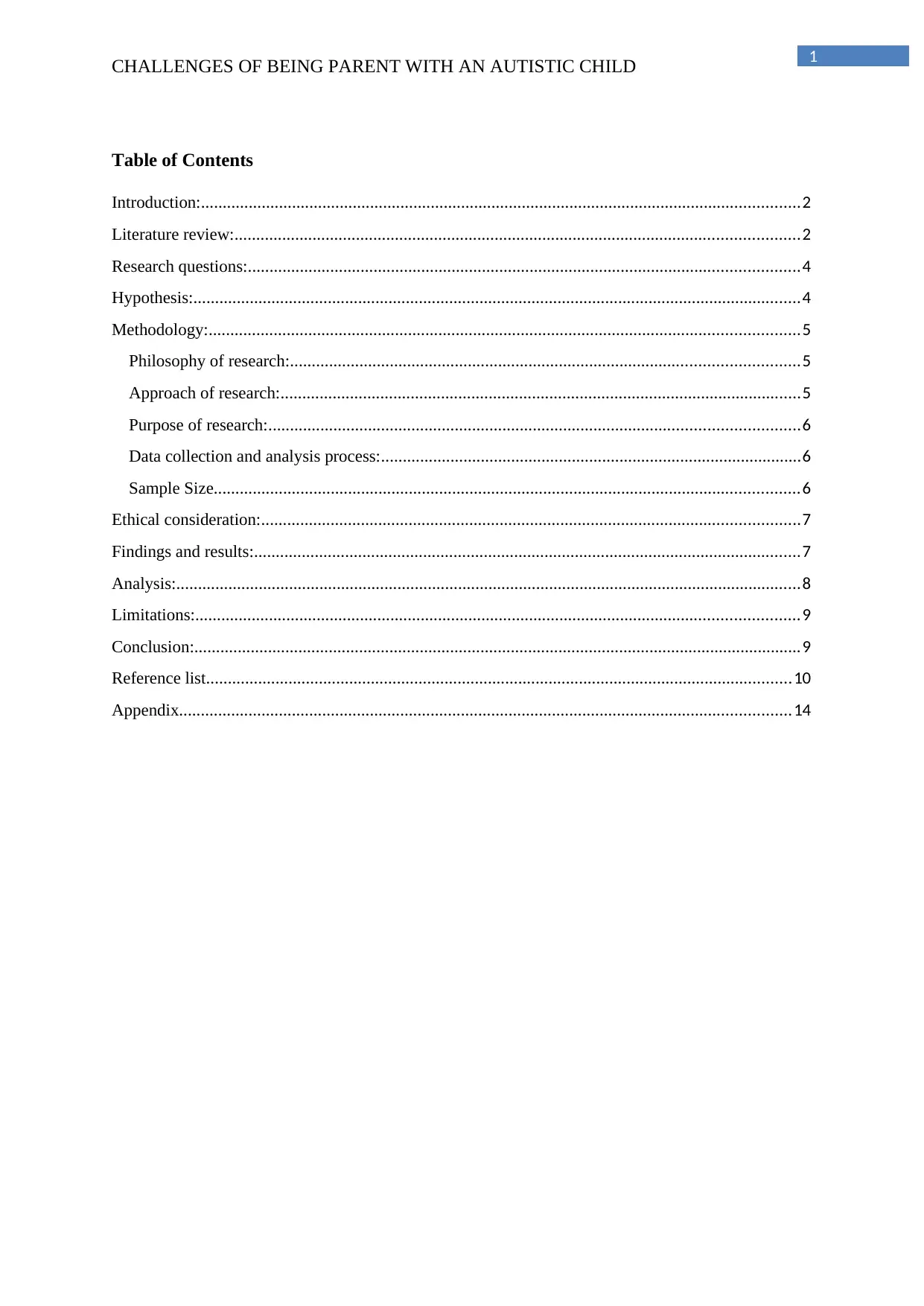
1
CHALLENGES OF BEING PARENT WITH AN AUTISTIC CHILD
Table of Contents
Introduction:..........................................................................................................................................2
Literature review:..................................................................................................................................2
Research questions:...............................................................................................................................4
Hypothesis:............................................................................................................................................4
Methodology:........................................................................................................................................5
Philosophy of research:.....................................................................................................................5
Approach of research:........................................................................................................................5
Purpose of research:..........................................................................................................................6
Data collection and analysis process:.................................................................................................6
Sample Size.......................................................................................................................................6
Ethical consideration:............................................................................................................................7
Findings and results:..............................................................................................................................7
Analysis:................................................................................................................................................8
Limitations:...........................................................................................................................................9
Conclusion:............................................................................................................................................9
Reference list.......................................................................................................................................10
Appendix.............................................................................................................................................14
CHALLENGES OF BEING PARENT WITH AN AUTISTIC CHILD
Table of Contents
Introduction:..........................................................................................................................................2
Literature review:..................................................................................................................................2
Research questions:...............................................................................................................................4
Hypothesis:............................................................................................................................................4
Methodology:........................................................................................................................................5
Philosophy of research:.....................................................................................................................5
Approach of research:........................................................................................................................5
Purpose of research:..........................................................................................................................6
Data collection and analysis process:.................................................................................................6
Sample Size.......................................................................................................................................6
Ethical consideration:............................................................................................................................7
Findings and results:..............................................................................................................................7
Analysis:................................................................................................................................................8
Limitations:...........................................................................................................................................9
Conclusion:............................................................................................................................................9
Reference list.......................................................................................................................................10
Appendix.............................................................................................................................................14
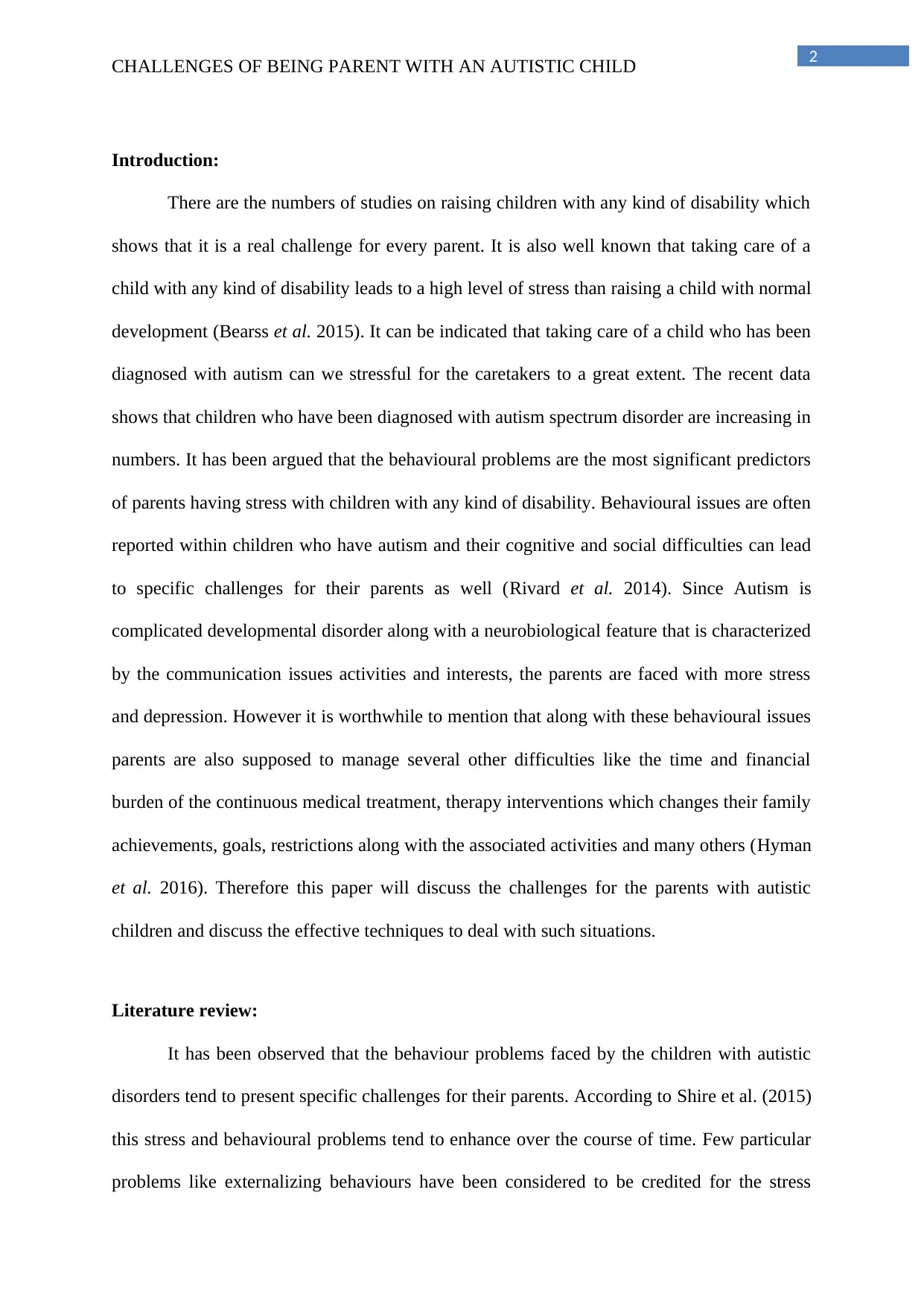
2
CHALLENGES OF BEING PARENT WITH AN AUTISTIC CHILD
Introduction:
There are the numbers of studies on raising children with any kind of disability which
shows that it is a real challenge for every parent. It is also well known that taking care of a
child with any kind of disability leads to a high level of stress than raising a child with normal
development (Bearss et al. 2015). It can be indicated that taking care of a child who has been
diagnosed with autism can we stressful for the caretakers to a great extent. The recent data
shows that children who have been diagnosed with autism spectrum disorder are increasing in
numbers. It has been argued that the behavioural problems are the most significant predictors
of parents having stress with children with any kind of disability. Behavioural issues are often
reported within children who have autism and their cognitive and social difficulties can lead
to specific challenges for their parents as well (Rivard et al. 2014). Since Autism is
complicated developmental disorder along with a neurobiological feature that is characterized
by the communication issues activities and interests, the parents are faced with more stress
and depression. However it is worthwhile to mention that along with these behavioural issues
parents are also supposed to manage several other difficulties like the time and financial
burden of the continuous medical treatment, therapy interventions which changes their family
achievements, goals, restrictions along with the associated activities and many others (Hyman
et al. 2016). Therefore this paper will discuss the challenges for the parents with autistic
children and discuss the effective techniques to deal with such situations.
Literature review:
It has been observed that the behaviour problems faced by the children with autistic
disorders tend to present specific challenges for their parents. According to Shire et al. (2015)
this stress and behavioural problems tend to enhance over the course of time. Few particular
problems like externalizing behaviours have been considered to be credited for the stress
CHALLENGES OF BEING PARENT WITH AN AUTISTIC CHILD
Introduction:
There are the numbers of studies on raising children with any kind of disability which
shows that it is a real challenge for every parent. It is also well known that taking care of a
child with any kind of disability leads to a high level of stress than raising a child with normal
development (Bearss et al. 2015). It can be indicated that taking care of a child who has been
diagnosed with autism can we stressful for the caretakers to a great extent. The recent data
shows that children who have been diagnosed with autism spectrum disorder are increasing in
numbers. It has been argued that the behavioural problems are the most significant predictors
of parents having stress with children with any kind of disability. Behavioural issues are often
reported within children who have autism and their cognitive and social difficulties can lead
to specific challenges for their parents as well (Rivard et al. 2014). Since Autism is
complicated developmental disorder along with a neurobiological feature that is characterized
by the communication issues activities and interests, the parents are faced with more stress
and depression. However it is worthwhile to mention that along with these behavioural issues
parents are also supposed to manage several other difficulties like the time and financial
burden of the continuous medical treatment, therapy interventions which changes their family
achievements, goals, restrictions along with the associated activities and many others (Hyman
et al. 2016). Therefore this paper will discuss the challenges for the parents with autistic
children and discuss the effective techniques to deal with such situations.
Literature review:
It has been observed that the behaviour problems faced by the children with autistic
disorders tend to present specific challenges for their parents. According to Shire et al. (2015)
this stress and behavioural problems tend to enhance over the course of time. Few particular
problems like externalizing behaviours have been considered to be credited for the stress
⊘ This is a preview!⊘
Do you want full access?
Subscribe today to unlock all pages.

Trusted by 1+ million students worldwide
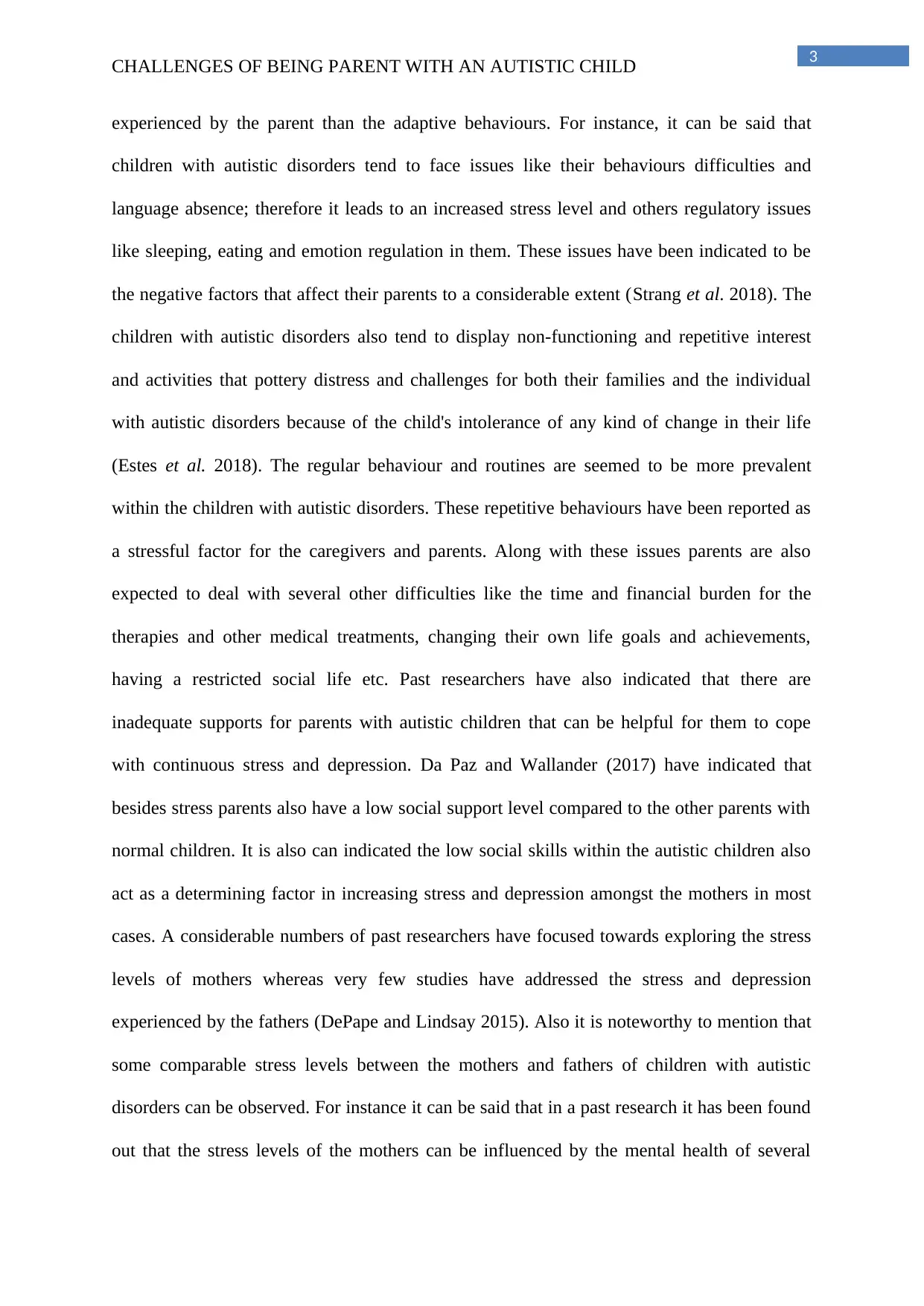
3
CHALLENGES OF BEING PARENT WITH AN AUTISTIC CHILD
experienced by the parent than the adaptive behaviours. For instance, it can be said that
children with autistic disorders tend to face issues like their behaviours difficulties and
language absence; therefore it leads to an increased stress level and others regulatory issues
like sleeping, eating and emotion regulation in them. These issues have been indicated to be
the negative factors that affect their parents to a considerable extent (Strang et al. 2018). The
children with autistic disorders also tend to display non-functioning and repetitive interest
and activities that pottery distress and challenges for both their families and the individual
with autistic disorders because of the child's intolerance of any kind of change in their life
(Estes et al. 2018). The regular behaviour and routines are seemed to be more prevalent
within the children with autistic disorders. These repetitive behaviours have been reported as
a stressful factor for the caregivers and parents. Along with these issues parents are also
expected to deal with several other difficulties like the time and financial burden for the
therapies and other medical treatments, changing their own life goals and achievements,
having a restricted social life etc. Past researchers have also indicated that there are
inadequate supports for parents with autistic children that can be helpful for them to cope
with continuous stress and depression. Da Paz and Wallander (2017) have indicated that
besides stress parents also have a low social support level compared to the other parents with
normal children. It is also can indicated the low social skills within the autistic children also
act as a determining factor in increasing stress and depression amongst the mothers in most
cases. A considerable numbers of past researchers have focused towards exploring the stress
levels of mothers whereas very few studies have addressed the stress and depression
experienced by the fathers (DePape and Lindsay 2015). Also it is noteworthy to mention that
some comparable stress levels between the mothers and fathers of children with autistic
disorders can be observed. For instance it can be said that in a past research it has been found
out that the stress levels of the mothers can be influenced by the mental health of several
CHALLENGES OF BEING PARENT WITH AN AUTISTIC CHILD
experienced by the parent than the adaptive behaviours. For instance, it can be said that
children with autistic disorders tend to face issues like their behaviours difficulties and
language absence; therefore it leads to an increased stress level and others regulatory issues
like sleeping, eating and emotion regulation in them. These issues have been indicated to be
the negative factors that affect their parents to a considerable extent (Strang et al. 2018). The
children with autistic disorders also tend to display non-functioning and repetitive interest
and activities that pottery distress and challenges for both their families and the individual
with autistic disorders because of the child's intolerance of any kind of change in their life
(Estes et al. 2018). The regular behaviour and routines are seemed to be more prevalent
within the children with autistic disorders. These repetitive behaviours have been reported as
a stressful factor for the caregivers and parents. Along with these issues parents are also
expected to deal with several other difficulties like the time and financial burden for the
therapies and other medical treatments, changing their own life goals and achievements,
having a restricted social life etc. Past researchers have also indicated that there are
inadequate supports for parents with autistic children that can be helpful for them to cope
with continuous stress and depression. Da Paz and Wallander (2017) have indicated that
besides stress parents also have a low social support level compared to the other parents with
normal children. It is also can indicated the low social skills within the autistic children also
act as a determining factor in increasing stress and depression amongst the mothers in most
cases. A considerable numbers of past researchers have focused towards exploring the stress
levels of mothers whereas very few studies have addressed the stress and depression
experienced by the fathers (DePape and Lindsay 2015). Also it is noteworthy to mention that
some comparable stress levels between the mothers and fathers of children with autistic
disorders can be observed. For instance it can be said that in a past research it has been found
out that the stress levels of the mothers can be influenced by the mental health of several
Paraphrase This Document
Need a fresh take? Get an instant paraphrase of this document with our AI Paraphraser
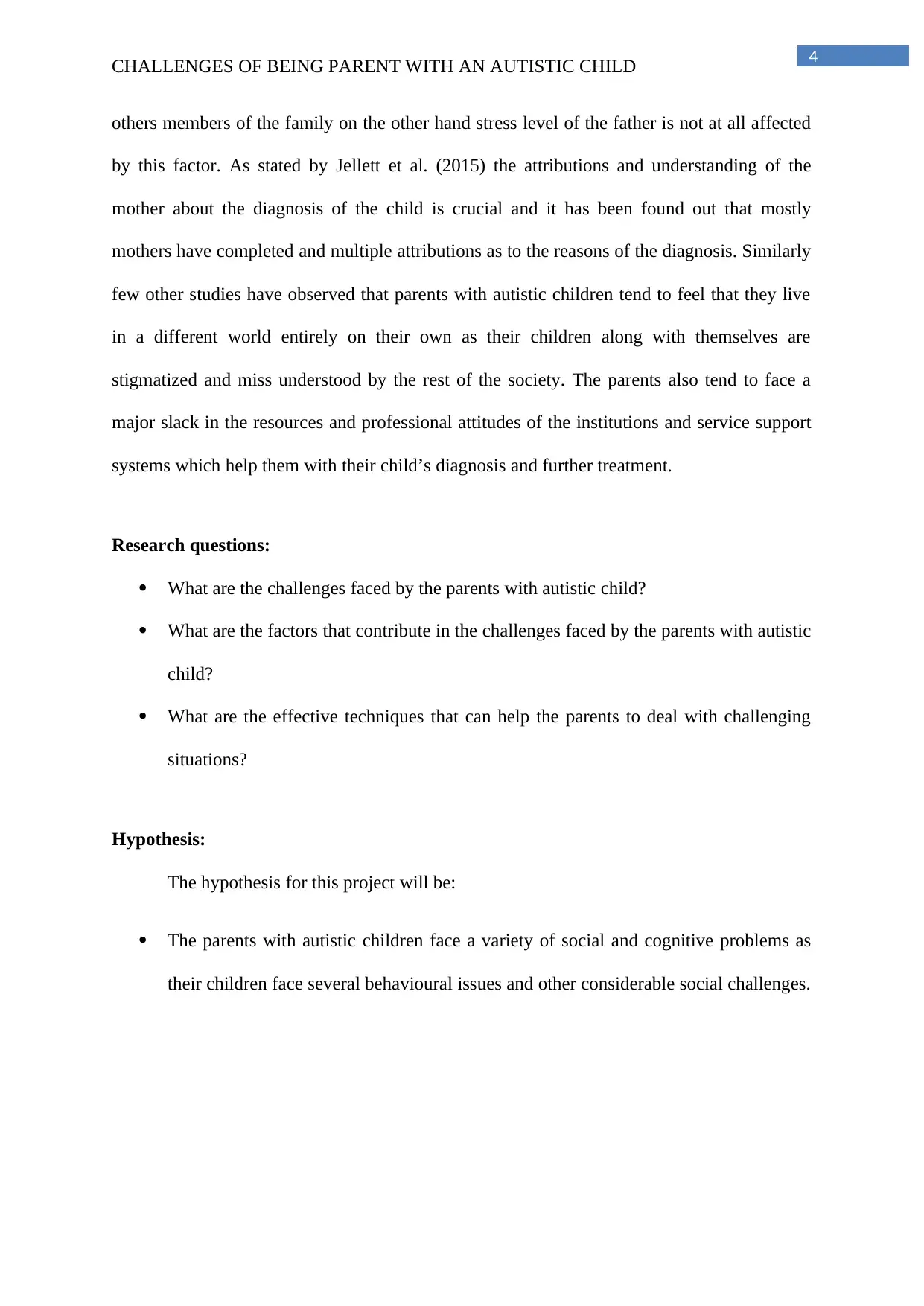
4
CHALLENGES OF BEING PARENT WITH AN AUTISTIC CHILD
others members of the family on the other hand stress level of the father is not at all affected
by this factor. As stated by Jellett et al. (2015) the attributions and understanding of the
mother about the diagnosis of the child is crucial and it has been found out that mostly
mothers have completed and multiple attributions as to the reasons of the diagnosis. Similarly
few other studies have observed that parents with autistic children tend to feel that they live
in a different world entirely on their own as their children along with themselves are
stigmatized and miss understood by the rest of the society. The parents also tend to face a
major slack in the resources and professional attitudes of the institutions and service support
systems which help them with their child’s diagnosis and further treatment.
Research questions:
What are the challenges faced by the parents with autistic child?
What are the factors that contribute in the challenges faced by the parents with autistic
child?
What are the effective techniques that can help the parents to deal with challenging
situations?
Hypothesis:
The hypothesis for this project will be:
The parents with autistic children face a variety of social and cognitive problems as
their children face several behavioural issues and other considerable social challenges.
CHALLENGES OF BEING PARENT WITH AN AUTISTIC CHILD
others members of the family on the other hand stress level of the father is not at all affected
by this factor. As stated by Jellett et al. (2015) the attributions and understanding of the
mother about the diagnosis of the child is crucial and it has been found out that mostly
mothers have completed and multiple attributions as to the reasons of the diagnosis. Similarly
few other studies have observed that parents with autistic children tend to feel that they live
in a different world entirely on their own as their children along with themselves are
stigmatized and miss understood by the rest of the society. The parents also tend to face a
major slack in the resources and professional attitudes of the institutions and service support
systems which help them with their child’s diagnosis and further treatment.
Research questions:
What are the challenges faced by the parents with autistic child?
What are the factors that contribute in the challenges faced by the parents with autistic
child?
What are the effective techniques that can help the parents to deal with challenging
situations?
Hypothesis:
The hypothesis for this project will be:
The parents with autistic children face a variety of social and cognitive problems as
their children face several behavioural issues and other considerable social challenges.
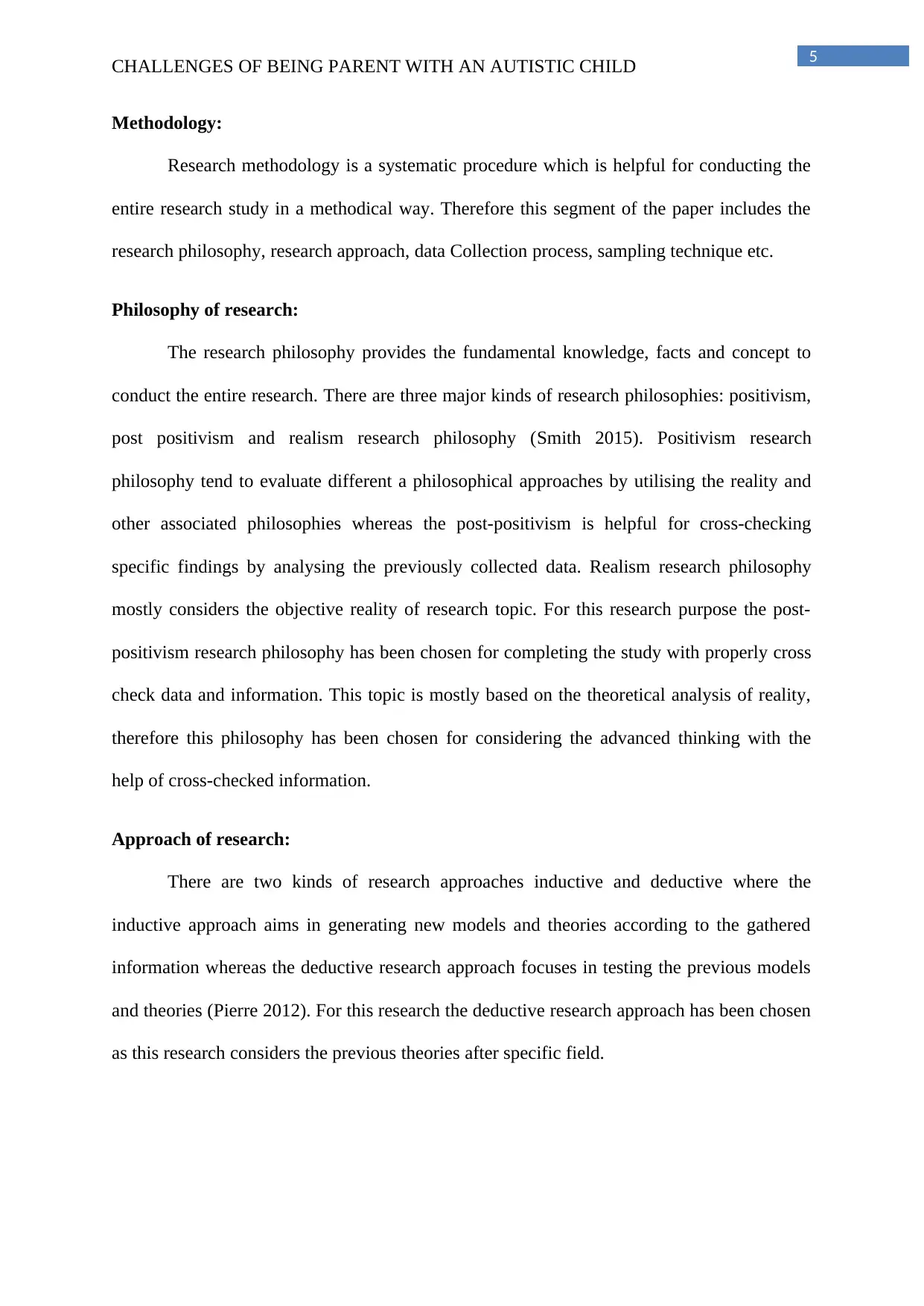
5
CHALLENGES OF BEING PARENT WITH AN AUTISTIC CHILD
Methodology:
Research methodology is a systematic procedure which is helpful for conducting the
entire research study in a methodical way. Therefore this segment of the paper includes the
research philosophy, research approach, data Collection process, sampling technique etc.
Philosophy of research:
The research philosophy provides the fundamental knowledge, facts and concept to
conduct the entire research. There are three major kinds of research philosophies: positivism,
post positivism and realism research philosophy (Smith 2015). Positivism research
philosophy tend to evaluate different a philosophical approaches by utilising the reality and
other associated philosophies whereas the post-positivism is helpful for cross-checking
specific findings by analysing the previously collected data. Realism research philosophy
mostly considers the objective reality of research topic. For this research purpose the post-
positivism research philosophy has been chosen for completing the study with properly cross
check data and information. This topic is mostly based on the theoretical analysis of reality,
therefore this philosophy has been chosen for considering the advanced thinking with the
help of cross-checked information.
Approach of research:
There are two kinds of research approaches inductive and deductive where the
inductive approach aims in generating new models and theories according to the gathered
information whereas the deductive research approach focuses in testing the previous models
and theories (Pierre 2012). For this research the deductive research approach has been chosen
as this research considers the previous theories after specific field.
CHALLENGES OF BEING PARENT WITH AN AUTISTIC CHILD
Methodology:
Research methodology is a systematic procedure which is helpful for conducting the
entire research study in a methodical way. Therefore this segment of the paper includes the
research philosophy, research approach, data Collection process, sampling technique etc.
Philosophy of research:
The research philosophy provides the fundamental knowledge, facts and concept to
conduct the entire research. There are three major kinds of research philosophies: positivism,
post positivism and realism research philosophy (Smith 2015). Positivism research
philosophy tend to evaluate different a philosophical approaches by utilising the reality and
other associated philosophies whereas the post-positivism is helpful for cross-checking
specific findings by analysing the previously collected data. Realism research philosophy
mostly considers the objective reality of research topic. For this research purpose the post-
positivism research philosophy has been chosen for completing the study with properly cross
check data and information. This topic is mostly based on the theoretical analysis of reality,
therefore this philosophy has been chosen for considering the advanced thinking with the
help of cross-checked information.
Approach of research:
There are two kinds of research approaches inductive and deductive where the
inductive approach aims in generating new models and theories according to the gathered
information whereas the deductive research approach focuses in testing the previous models
and theories (Pierre 2012). For this research the deductive research approach has been chosen
as this research considers the previous theories after specific field.
⊘ This is a preview!⊘
Do you want full access?
Subscribe today to unlock all pages.

Trusted by 1+ million students worldwide
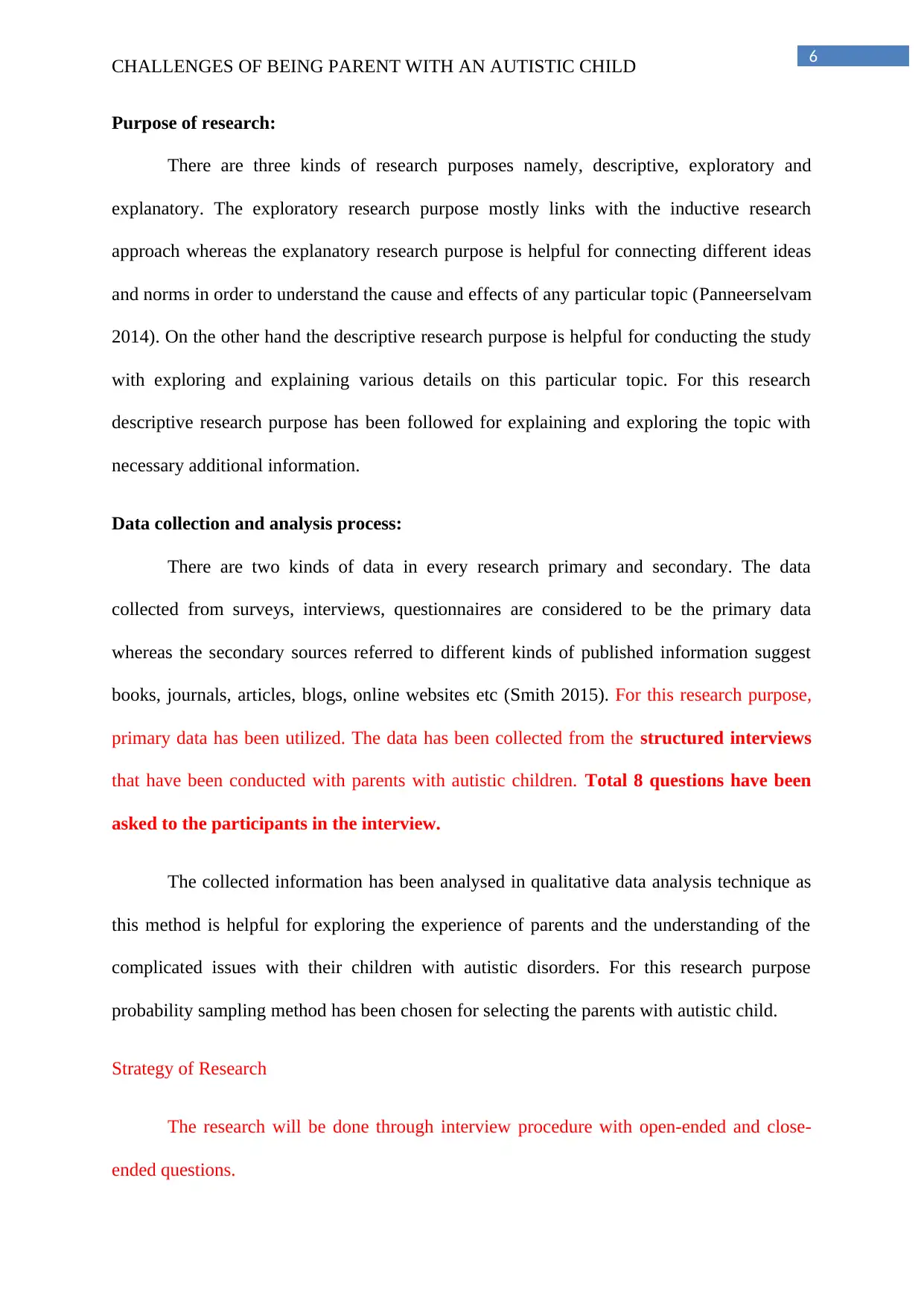
6
CHALLENGES OF BEING PARENT WITH AN AUTISTIC CHILD
Purpose of research:
There are three kinds of research purposes namely, descriptive, exploratory and
explanatory. The exploratory research purpose mostly links with the inductive research
approach whereas the explanatory research purpose is helpful for connecting different ideas
and norms in order to understand the cause and effects of any particular topic (Panneerselvam
2014). On the other hand the descriptive research purpose is helpful for conducting the study
with exploring and explaining various details on this particular topic. For this research
descriptive research purpose has been followed for explaining and exploring the topic with
necessary additional information.
Data collection and analysis process:
There are two kinds of data in every research primary and secondary. The data
collected from surveys, interviews, questionnaires are considered to be the primary data
whereas the secondary sources referred to different kinds of published information suggest
books, journals, articles, blogs, online websites etc (Smith 2015). For this research purpose,
primary data has been utilized. The data has been collected from the structured interviews
that have been conducted with parents with autistic children. Total 8 questions have been
asked to the participants in the interview.
The collected information has been analysed in qualitative data analysis technique as
this method is helpful for exploring the experience of parents and the understanding of the
complicated issues with their children with autistic disorders. For this research purpose
probability sampling method has been chosen for selecting the parents with autistic child.
Strategy of Research
The research will be done through interview procedure with open-ended and close-
ended questions.
CHALLENGES OF BEING PARENT WITH AN AUTISTIC CHILD
Purpose of research:
There are three kinds of research purposes namely, descriptive, exploratory and
explanatory. The exploratory research purpose mostly links with the inductive research
approach whereas the explanatory research purpose is helpful for connecting different ideas
and norms in order to understand the cause and effects of any particular topic (Panneerselvam
2014). On the other hand the descriptive research purpose is helpful for conducting the study
with exploring and explaining various details on this particular topic. For this research
descriptive research purpose has been followed for explaining and exploring the topic with
necessary additional information.
Data collection and analysis process:
There are two kinds of data in every research primary and secondary. The data
collected from surveys, interviews, questionnaires are considered to be the primary data
whereas the secondary sources referred to different kinds of published information suggest
books, journals, articles, blogs, online websites etc (Smith 2015). For this research purpose,
primary data has been utilized. The data has been collected from the structured interviews
that have been conducted with parents with autistic children. Total 8 questions have been
asked to the participants in the interview.
The collected information has been analysed in qualitative data analysis technique as
this method is helpful for exploring the experience of parents and the understanding of the
complicated issues with their children with autistic disorders. For this research purpose
probability sampling method has been chosen for selecting the parents with autistic child.
Strategy of Research
The research will be done through interview procedure with open-ended and close-
ended questions.
Paraphrase This Document
Need a fresh take? Get an instant paraphrase of this document with our AI Paraphraser
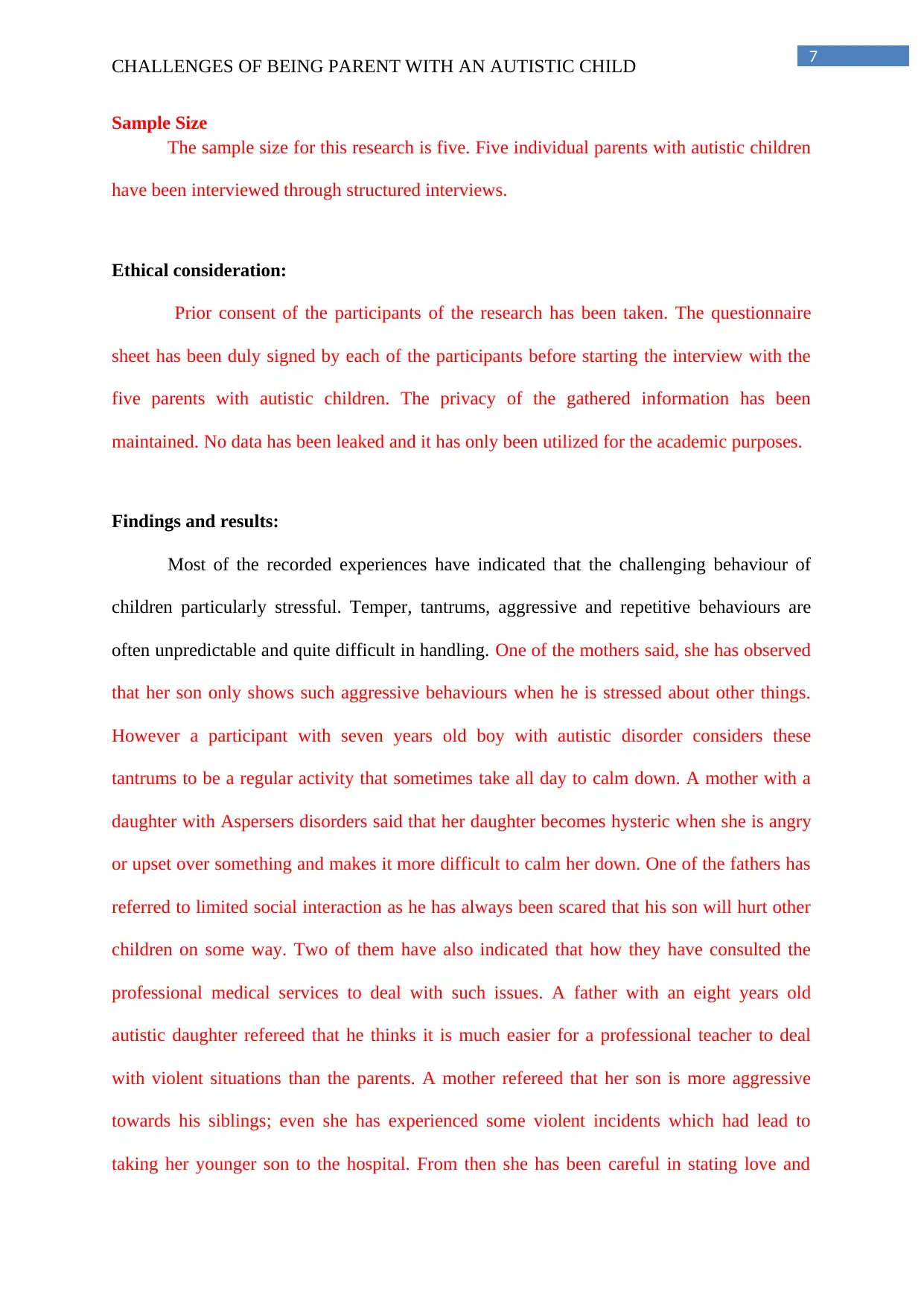
7
CHALLENGES OF BEING PARENT WITH AN AUTISTIC CHILD
Sample Size
The sample size for this research is five. Five individual parents with autistic children
have been interviewed through structured interviews.
Ethical consideration:
Prior consent of the participants of the research has been taken. The questionnaire
sheet has been duly signed by each of the participants before starting the interview with the
five parents with autistic children. The privacy of the gathered information has been
maintained. No data has been leaked and it has only been utilized for the academic purposes.
Findings and results:
Most of the recorded experiences have indicated that the challenging behaviour of
children particularly stressful. Temper, tantrums, aggressive and repetitive behaviours are
often unpredictable and quite difficult in handling. One of the mothers said, she has observed
that her son only shows such aggressive behaviours when he is stressed about other things.
However a participant with seven years old boy with autistic disorder considers these
tantrums to be a regular activity that sometimes take all day to calm down. A mother with a
daughter with Aspersers disorders said that her daughter becomes hysteric when she is angry
or upset over something and makes it more difficult to calm her down. One of the fathers has
referred to limited social interaction as he has always been scared that his son will hurt other
children on some way. Two of them have also indicated that how they have consulted the
professional medical services to deal with such issues. A father with an eight years old
autistic daughter refereed that he thinks it is much easier for a professional teacher to deal
with violent situations than the parents. A mother refereed that her son is more aggressive
towards his siblings; even she has experienced some violent incidents which had lead to
taking her younger son to the hospital. From then she has been careful in stating love and
CHALLENGES OF BEING PARENT WITH AN AUTISTIC CHILD
Sample Size
The sample size for this research is five. Five individual parents with autistic children
have been interviewed through structured interviews.
Ethical consideration:
Prior consent of the participants of the research has been taken. The questionnaire
sheet has been duly signed by each of the participants before starting the interview with the
five parents with autistic children. The privacy of the gathered information has been
maintained. No data has been leaked and it has only been utilized for the academic purposes.
Findings and results:
Most of the recorded experiences have indicated that the challenging behaviour of
children particularly stressful. Temper, tantrums, aggressive and repetitive behaviours are
often unpredictable and quite difficult in handling. One of the mothers said, she has observed
that her son only shows such aggressive behaviours when he is stressed about other things.
However a participant with seven years old boy with autistic disorder considers these
tantrums to be a regular activity that sometimes take all day to calm down. A mother with a
daughter with Aspersers disorders said that her daughter becomes hysteric when she is angry
or upset over something and makes it more difficult to calm her down. One of the fathers has
referred to limited social interaction as he has always been scared that his son will hurt other
children on some way. Two of them have also indicated that how they have consulted the
professional medical services to deal with such issues. A father with an eight years old
autistic daughter refereed that he thinks it is much easier for a professional teacher to deal
with violent situations than the parents. A mother refereed that her son is more aggressive
towards his siblings; even she has experienced some violent incidents which had lead to
taking her younger son to the hospital. From then she has been careful in stating love and
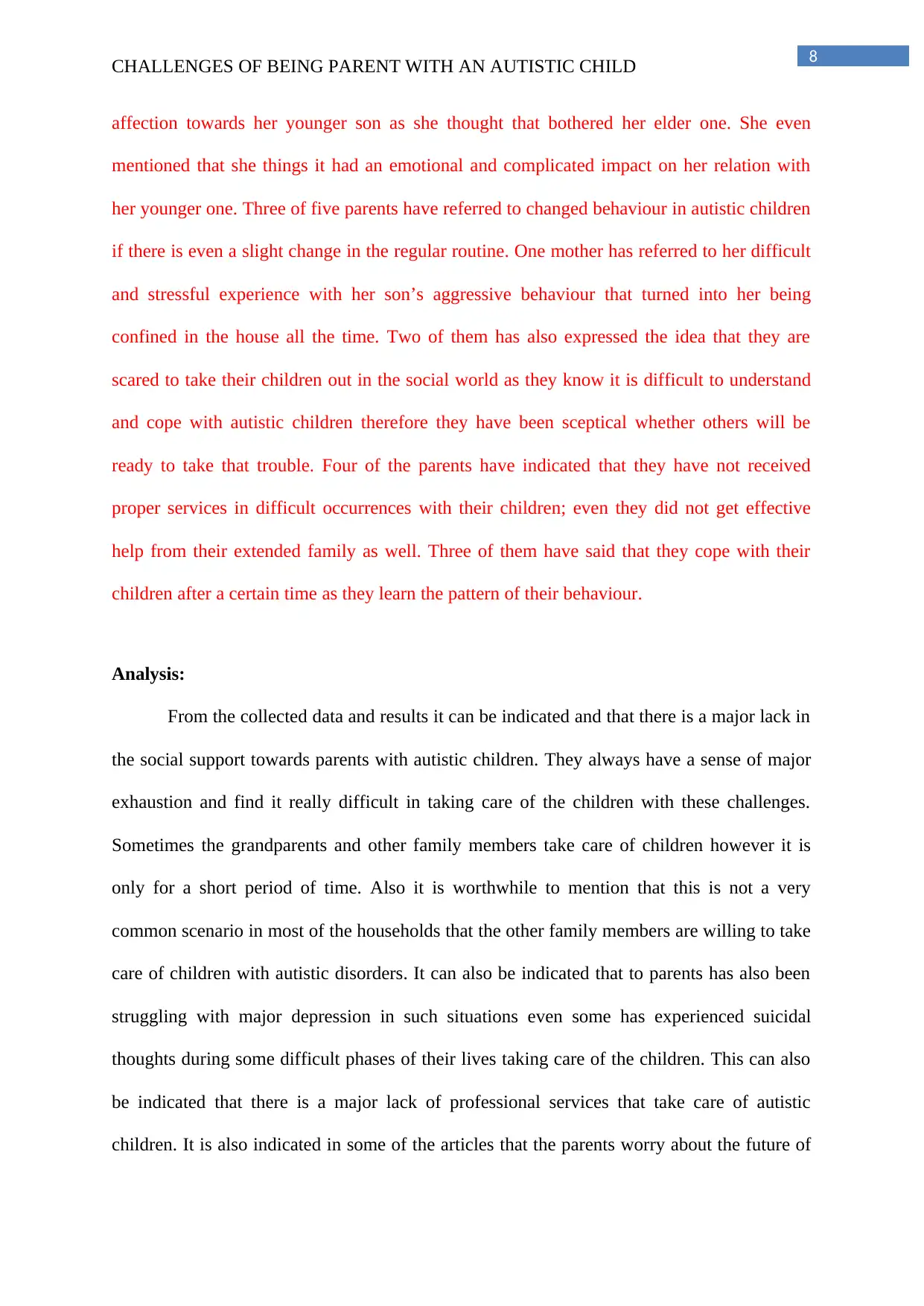
8
CHALLENGES OF BEING PARENT WITH AN AUTISTIC CHILD
affection towards her younger son as she thought that bothered her elder one. She even
mentioned that she things it had an emotional and complicated impact on her relation with
her younger one. Three of five parents have referred to changed behaviour in autistic children
if there is even a slight change in the regular routine. One mother has referred to her difficult
and stressful experience with her son’s aggressive behaviour that turned into her being
confined in the house all the time. Two of them has also expressed the idea that they are
scared to take their children out in the social world as they know it is difficult to understand
and cope with autistic children therefore they have been sceptical whether others will be
ready to take that trouble. Four of the parents have indicated that they have not received
proper services in difficult occurrences with their children; even they did not get effective
help from their extended family as well. Three of them have said that they cope with their
children after a certain time as they learn the pattern of their behaviour.
Analysis:
From the collected data and results it can be indicated and that there is a major lack in
the social support towards parents with autistic children. They always have a sense of major
exhaustion and find it really difficult in taking care of the children with these challenges.
Sometimes the grandparents and other family members take care of children however it is
only for a short period of time. Also it is worthwhile to mention that this is not a very
common scenario in most of the households that the other family members are willing to take
care of children with autistic disorders. It can also be indicated that to parents has also been
struggling with major depression in such situations even some has experienced suicidal
thoughts during some difficult phases of their lives taking care of the children. This can also
be indicated that there is a major lack of professional services that take care of autistic
children. It is also indicated in some of the articles that the parents worry about the future of
CHALLENGES OF BEING PARENT WITH AN AUTISTIC CHILD
affection towards her younger son as she thought that bothered her elder one. She even
mentioned that she things it had an emotional and complicated impact on her relation with
her younger one. Three of five parents have referred to changed behaviour in autistic children
if there is even a slight change in the regular routine. One mother has referred to her difficult
and stressful experience with her son’s aggressive behaviour that turned into her being
confined in the house all the time. Two of them has also expressed the idea that they are
scared to take their children out in the social world as they know it is difficult to understand
and cope with autistic children therefore they have been sceptical whether others will be
ready to take that trouble. Four of the parents have indicated that they have not received
proper services in difficult occurrences with their children; even they did not get effective
help from their extended family as well. Three of them have said that they cope with their
children after a certain time as they learn the pattern of their behaviour.
Analysis:
From the collected data and results it can be indicated and that there is a major lack in
the social support towards parents with autistic children. They always have a sense of major
exhaustion and find it really difficult in taking care of the children with these challenges.
Sometimes the grandparents and other family members take care of children however it is
only for a short period of time. Also it is worthwhile to mention that this is not a very
common scenario in most of the households that the other family members are willing to take
care of children with autistic disorders. It can also be indicated that to parents has also been
struggling with major depression in such situations even some has experienced suicidal
thoughts during some difficult phases of their lives taking care of the children. This can also
be indicated that there is a major lack of professional services that take care of autistic
children. It is also indicated in some of the articles that the parents worry about the future of
⊘ This is a preview!⊘
Do you want full access?
Subscribe today to unlock all pages.

Trusted by 1+ million students worldwide
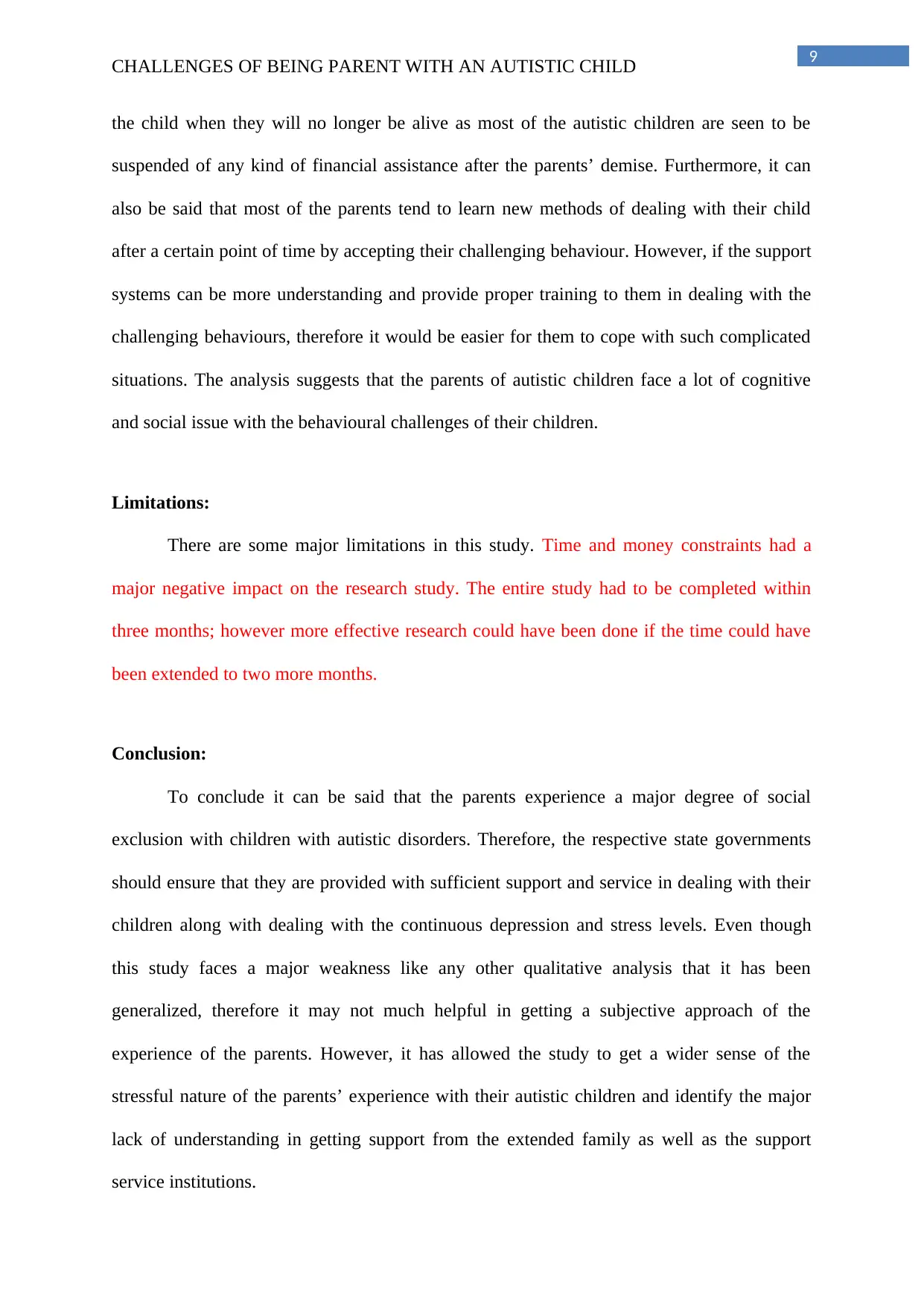
9
CHALLENGES OF BEING PARENT WITH AN AUTISTIC CHILD
the child when they will no longer be alive as most of the autistic children are seen to be
suspended of any kind of financial assistance after the parents’ demise. Furthermore, it can
also be said that most of the parents tend to learn new methods of dealing with their child
after a certain point of time by accepting their challenging behaviour. However, if the support
systems can be more understanding and provide proper training to them in dealing with the
challenging behaviours, therefore it would be easier for them to cope with such complicated
situations. The analysis suggests that the parents of autistic children face a lot of cognitive
and social issue with the behavioural challenges of their children.
Limitations:
There are some major limitations in this study. Time and money constraints had a
major negative impact on the research study. The entire study had to be completed within
three months; however more effective research could have been done if the time could have
been extended to two more months.
Conclusion:
To conclude it can be said that the parents experience a major degree of social
exclusion with children with autistic disorders. Therefore, the respective state governments
should ensure that they are provided with sufficient support and service in dealing with their
children along with dealing with the continuous depression and stress levels. Even though
this study faces a major weakness like any other qualitative analysis that it has been
generalized, therefore it may not much helpful in getting a subjective approach of the
experience of the parents. However, it has allowed the study to get a wider sense of the
stressful nature of the parents’ experience with their autistic children and identify the major
lack of understanding in getting support from the extended family as well as the support
service institutions.
CHALLENGES OF BEING PARENT WITH AN AUTISTIC CHILD
the child when they will no longer be alive as most of the autistic children are seen to be
suspended of any kind of financial assistance after the parents’ demise. Furthermore, it can
also be said that most of the parents tend to learn new methods of dealing with their child
after a certain point of time by accepting their challenging behaviour. However, if the support
systems can be more understanding and provide proper training to them in dealing with the
challenging behaviours, therefore it would be easier for them to cope with such complicated
situations. The analysis suggests that the parents of autistic children face a lot of cognitive
and social issue with the behavioural challenges of their children.
Limitations:
There are some major limitations in this study. Time and money constraints had a
major negative impact on the research study. The entire study had to be completed within
three months; however more effective research could have been done if the time could have
been extended to two more months.
Conclusion:
To conclude it can be said that the parents experience a major degree of social
exclusion with children with autistic disorders. Therefore, the respective state governments
should ensure that they are provided with sufficient support and service in dealing with their
children along with dealing with the continuous depression and stress levels. Even though
this study faces a major weakness like any other qualitative analysis that it has been
generalized, therefore it may not much helpful in getting a subjective approach of the
experience of the parents. However, it has allowed the study to get a wider sense of the
stressful nature of the parents’ experience with their autistic children and identify the major
lack of understanding in getting support from the extended family as well as the support
service institutions.
Paraphrase This Document
Need a fresh take? Get an instant paraphrase of this document with our AI Paraphraser
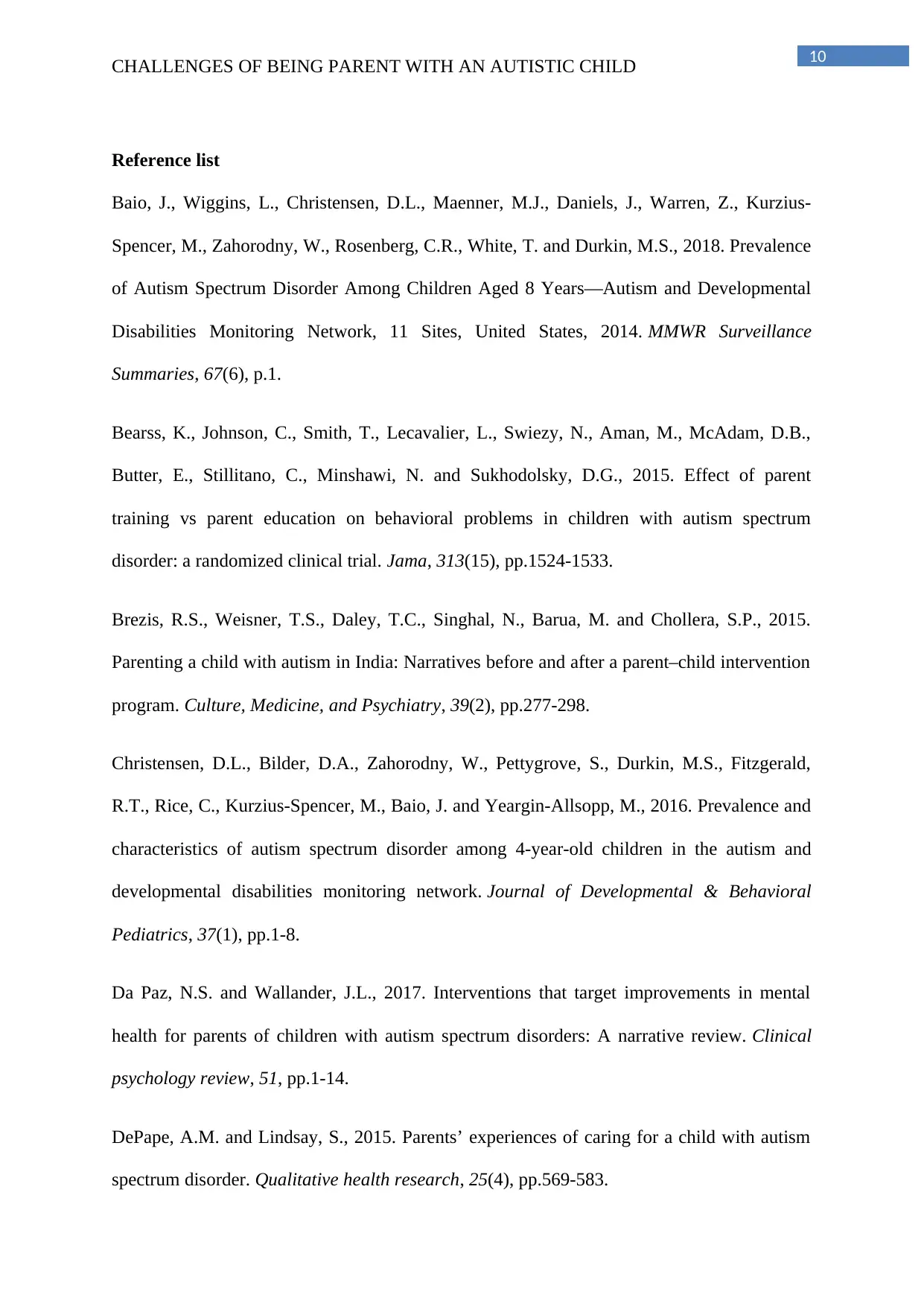
10
CHALLENGES OF BEING PARENT WITH AN AUTISTIC CHILD
Reference list
Baio, J., Wiggins, L., Christensen, D.L., Maenner, M.J., Daniels, J., Warren, Z., Kurzius-
Spencer, M., Zahorodny, W., Rosenberg, C.R., White, T. and Durkin, M.S., 2018. Prevalence
of Autism Spectrum Disorder Among Children Aged 8 Years—Autism and Developmental
Disabilities Monitoring Network, 11 Sites, United States, 2014. MMWR Surveillance
Summaries, 67(6), p.1.
Bearss, K., Johnson, C., Smith, T., Lecavalier, L., Swiezy, N., Aman, M., McAdam, D.B.,
Butter, E., Stillitano, C., Minshawi, N. and Sukhodolsky, D.G., 2015. Effect of parent
training vs parent education on behavioral problems in children with autism spectrum
disorder: a randomized clinical trial. Jama, 313(15), pp.1524-1533.
Brezis, R.S., Weisner, T.S., Daley, T.C., Singhal, N., Barua, M. and Chollera, S.P., 2015.
Parenting a child with autism in India: Narratives before and after a parent–child intervention
program. Culture, Medicine, and Psychiatry, 39(2), pp.277-298.
Christensen, D.L., Bilder, D.A., Zahorodny, W., Pettygrove, S., Durkin, M.S., Fitzgerald,
R.T., Rice, C., Kurzius-Spencer, M., Baio, J. and Yeargin-Allsopp, M., 2016. Prevalence and
characteristics of autism spectrum disorder among 4-year-old children in the autism and
developmental disabilities monitoring network. Journal of Developmental & Behavioral
Pediatrics, 37(1), pp.1-8.
Da Paz, N.S. and Wallander, J.L., 2017. Interventions that target improvements in mental
health for parents of children with autism spectrum disorders: A narrative review. Clinical
psychology review, 51, pp.1-14.
DePape, A.M. and Lindsay, S., 2015. Parents’ experiences of caring for a child with autism
spectrum disorder. Qualitative health research, 25(4), pp.569-583.
CHALLENGES OF BEING PARENT WITH AN AUTISTIC CHILD
Reference list
Baio, J., Wiggins, L., Christensen, D.L., Maenner, M.J., Daniels, J., Warren, Z., Kurzius-
Spencer, M., Zahorodny, W., Rosenberg, C.R., White, T. and Durkin, M.S., 2018. Prevalence
of Autism Spectrum Disorder Among Children Aged 8 Years—Autism and Developmental
Disabilities Monitoring Network, 11 Sites, United States, 2014. MMWR Surveillance
Summaries, 67(6), p.1.
Bearss, K., Johnson, C., Smith, T., Lecavalier, L., Swiezy, N., Aman, M., McAdam, D.B.,
Butter, E., Stillitano, C., Minshawi, N. and Sukhodolsky, D.G., 2015. Effect of parent
training vs parent education on behavioral problems in children with autism spectrum
disorder: a randomized clinical trial. Jama, 313(15), pp.1524-1533.
Brezis, R.S., Weisner, T.S., Daley, T.C., Singhal, N., Barua, M. and Chollera, S.P., 2015.
Parenting a child with autism in India: Narratives before and after a parent–child intervention
program. Culture, Medicine, and Psychiatry, 39(2), pp.277-298.
Christensen, D.L., Bilder, D.A., Zahorodny, W., Pettygrove, S., Durkin, M.S., Fitzgerald,
R.T., Rice, C., Kurzius-Spencer, M., Baio, J. and Yeargin-Allsopp, M., 2016. Prevalence and
characteristics of autism spectrum disorder among 4-year-old children in the autism and
developmental disabilities monitoring network. Journal of Developmental & Behavioral
Pediatrics, 37(1), pp.1-8.
Da Paz, N.S. and Wallander, J.L., 2017. Interventions that target improvements in mental
health for parents of children with autism spectrum disorders: A narrative review. Clinical
psychology review, 51, pp.1-14.
DePape, A.M. and Lindsay, S., 2015. Parents’ experiences of caring for a child with autism
spectrum disorder. Qualitative health research, 25(4), pp.569-583.
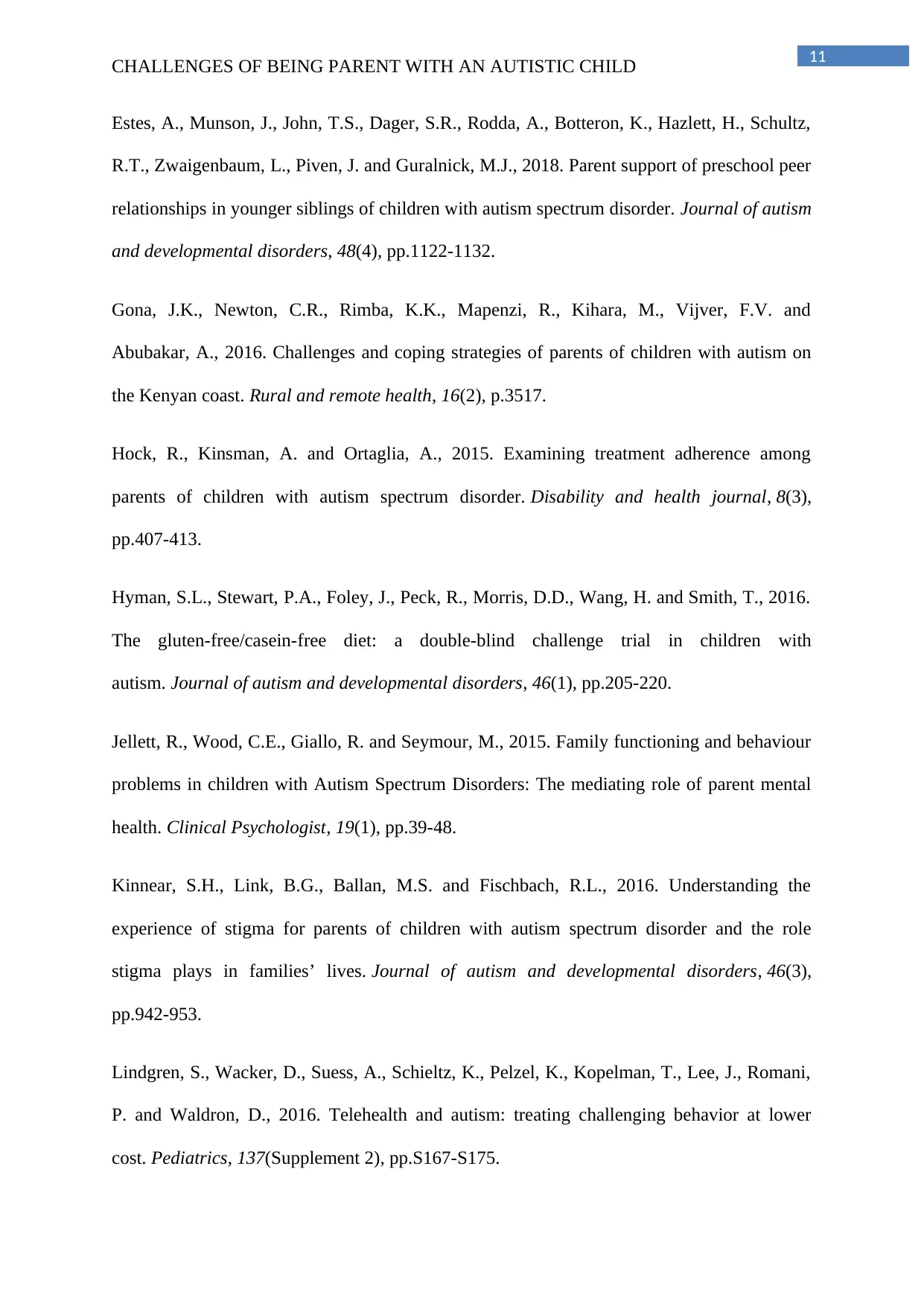
11
CHALLENGES OF BEING PARENT WITH AN AUTISTIC CHILD
Estes, A., Munson, J., John, T.S., Dager, S.R., Rodda, A., Botteron, K., Hazlett, H., Schultz,
R.T., Zwaigenbaum, L., Piven, J. and Guralnick, M.J., 2018. Parent support of preschool peer
relationships in younger siblings of children with autism spectrum disorder. Journal of autism
and developmental disorders, 48(4), pp.1122-1132.
Gona, J.K., Newton, C.R., Rimba, K.K., Mapenzi, R., Kihara, M., Vijver, F.V. and
Abubakar, A., 2016. Challenges and coping strategies of parents of children with autism on
the Kenyan coast. Rural and remote health, 16(2), p.3517.
Hock, R., Kinsman, A. and Ortaglia, A., 2015. Examining treatment adherence among
parents of children with autism spectrum disorder. Disability and health journal, 8(3),
pp.407-413.
Hyman, S.L., Stewart, P.A., Foley, J., Peck, R., Morris, D.D., Wang, H. and Smith, T., 2016.
The gluten-free/casein-free diet: a double-blind challenge trial in children with
autism. Journal of autism and developmental disorders, 46(1), pp.205-220.
Jellett, R., Wood, C.E., Giallo, R. and Seymour, M., 2015. Family functioning and behaviour
problems in children with Autism Spectrum Disorders: The mediating role of parent mental
health. Clinical Psychologist, 19(1), pp.39-48.
Kinnear, S.H., Link, B.G., Ballan, M.S. and Fischbach, R.L., 2016. Understanding the
experience of stigma for parents of children with autism spectrum disorder and the role
stigma plays in families’ lives. Journal of autism and developmental disorders, 46(3),
pp.942-953.
Lindgren, S., Wacker, D., Suess, A., Schieltz, K., Pelzel, K., Kopelman, T., Lee, J., Romani,
P. and Waldron, D., 2016. Telehealth and autism: treating challenging behavior at lower
cost. Pediatrics, 137(Supplement 2), pp.S167-S175.
CHALLENGES OF BEING PARENT WITH AN AUTISTIC CHILD
Estes, A., Munson, J., John, T.S., Dager, S.R., Rodda, A., Botteron, K., Hazlett, H., Schultz,
R.T., Zwaigenbaum, L., Piven, J. and Guralnick, M.J., 2018. Parent support of preschool peer
relationships in younger siblings of children with autism spectrum disorder. Journal of autism
and developmental disorders, 48(4), pp.1122-1132.
Gona, J.K., Newton, C.R., Rimba, K.K., Mapenzi, R., Kihara, M., Vijver, F.V. and
Abubakar, A., 2016. Challenges and coping strategies of parents of children with autism on
the Kenyan coast. Rural and remote health, 16(2), p.3517.
Hock, R., Kinsman, A. and Ortaglia, A., 2015. Examining treatment adherence among
parents of children with autism spectrum disorder. Disability and health journal, 8(3),
pp.407-413.
Hyman, S.L., Stewart, P.A., Foley, J., Peck, R., Morris, D.D., Wang, H. and Smith, T., 2016.
The gluten-free/casein-free diet: a double-blind challenge trial in children with
autism. Journal of autism and developmental disorders, 46(1), pp.205-220.
Jellett, R., Wood, C.E., Giallo, R. and Seymour, M., 2015. Family functioning and behaviour
problems in children with Autism Spectrum Disorders: The mediating role of parent mental
health. Clinical Psychologist, 19(1), pp.39-48.
Kinnear, S.H., Link, B.G., Ballan, M.S. and Fischbach, R.L., 2016. Understanding the
experience of stigma for parents of children with autism spectrum disorder and the role
stigma plays in families’ lives. Journal of autism and developmental disorders, 46(3),
pp.942-953.
Lindgren, S., Wacker, D., Suess, A., Schieltz, K., Pelzel, K., Kopelman, T., Lee, J., Romani,
P. and Waldron, D., 2016. Telehealth and autism: treating challenging behavior at lower
cost. Pediatrics, 137(Supplement 2), pp.S167-S175.
⊘ This is a preview!⊘
Do you want full access?
Subscribe today to unlock all pages.

Trusted by 1+ million students worldwide
1 out of 15
Related Documents
Your All-in-One AI-Powered Toolkit for Academic Success.
+13062052269
info@desklib.com
Available 24*7 on WhatsApp / Email
![[object Object]](/_next/static/media/star-bottom.7253800d.svg)
Unlock your academic potential
Copyright © 2020–2026 A2Z Services. All Rights Reserved. Developed and managed by ZUCOL.





